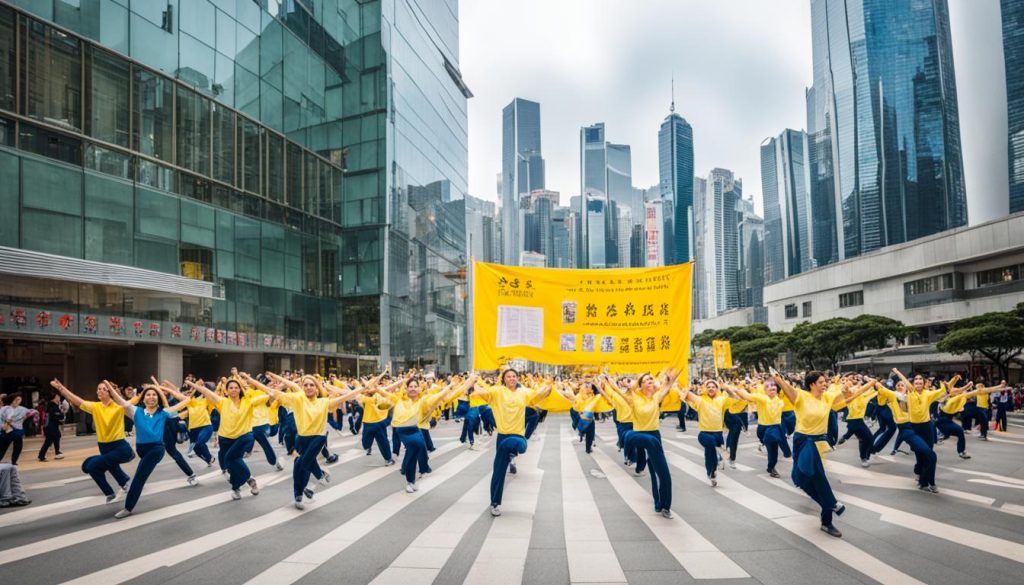Have you ever wondered about the origins and beliefs of Falun Gong, a new religious movement that has faced controversy and persecution in China?
Whether you’re curious about the spiritual teachings or want to understand why it has attracted millions of followers, this article will provide you with an in-depth exploration of Falun Gong’s rise, its global reach, and the challenges it faces in an authoritarian regime.
But first, let’s start by understanding what exactly Falun Gong is and how it became known as a new religious movement.
Content
Origins and History of the Falun Gong Religious Movement
Falun Gong, also known as Falun Dafa, has a rich and fascinating history that traces back to northeastern China in the early 1990s. Founded by Li Hongzhi, this spiritual practice quickly gained immense popularity, attracting millions of dedicated followers.
In its early years, the Chinese government initially supported the qigong movement, considering it a positive force for health and well-being.
However, as Falun Gong continued to grow in size and influence, authorities began to view it as a threat.
In 1999, the Chinese government implemented a ban on Falun Gong, labeling it an “illegal organization” and launching a massive crackdown to suppress its practice.
Despite the ban, Falun Gong persevered, and millions of practitioners around the world continue to embrace its teachings and engage in its spiritual practices.
To better understand the origins and historical context of Falun Gong, consider the following timeline:
| Year | Event |
|---|---|
| Early 1990s | The early 1990s |
| 1992 | The main text of Falun Gong, “Zhuan Falun,” is published, outlining the teachings and principles of the practice. |
| Mid-1990s | Falun Gong gains popularity and attracts millions of followers across China. |
| 1999 | The Chinese government bans Falun Gong, categorizing it as an “illegal organization” and initiating a widespread crackdown. |
| Present | Falun Gong continues to be practiced by millions of people worldwide, despite ongoing persecution in China. |
Despite the ban and the persecution faced by its practitioners, the rich history and teachings of Falun Gong continue to resonate with individuals seeking spiritual fulfillment and personal growth.
Beliefs and Teachings of Falun Gong
Falun Gong, also known as Falun Dafa, is a spiritual practice founded by Li Hongzhi. Adherents of Falun Gong believe in the practice of exercises and meditation to achieve spiritual elevation.
Central to Falun Gong are the core tenets of truthfulness, compassion, and forbearance. Practitioners strive to align their lives with these principles, cultivating moral character and inner peace.
Falun Gong emphasizes the concepts of karma and virtue, suggesting that individuals can improve their lives and well-being by cultivating positive actions and thoughts.
The spiritual practice also holds the belief in the existence of supernatural powers, such as the ability to heal oneself and others through energy manipulation.
Li Hongzhi, the founder of Falun Gong, is regarded as a spiritual leader and guide by followers of the practice. His teachings delve into various topics, including the nature of the universe, the cultivation of one’s character, and the pursuit of enlightenment.
Through the practice of Falun Gong, adherents aim for spiritual transformation, seeking to improve themselves and contribute to society. The teachings promote inner harmony, personal development, and a sense of connection to the world around them.
| Key Beliefs | Teachings | Spiritual Practice | Founder |
|---|---|---|---|
| Truthfulness | Cultivation of moral character | Exercises and meditation | Li Hongzhi |
| Compassion | Alignment with the principles of Falun Gong | Focus on positive actions and thoughts | Guidance on enlightenment |
| Forbearance | Belief in supernatural powers | Seeking spiritual transformation | Leader and spiritual guide |
Controversy and Persecution of Falun Gong

Falun Gong, a spiritual movement founded by Li Hongzhi in China, has been at the center of controversy and persecution.
The Chinese government has labeled Falun Gong as a “heretical cult” and has taken extreme measures to suppress its practice.
Falun Gong practitioners in China have faced a range of human rights abuses, including arbitrary arrests, detention, torture, and forced labor.
The international community has expressed concerns about the violation of human rights and religious freedom about the persecution of Falun Gong practitioners in China.
Activists and organizations around the world continue to raise awareness about the plight of Falun Gong practitioners and call for an end to the persecution.
Falun Gong’s Presence in Hong Kong

Hong Kong has become a sanctuary for Falun Gong practitioners seeking refuge and a space to exercise their spiritual beliefs.
Compared to mainland China, Hong Kong offers greater human rights protections, allowing followers of Falun Gong to openly practice and express their faith.
Falun Gong protests against the Chinese government have been common in Hong Kong for decades.
Demonstrations held by practitioners aim to raise awareness about the persecution and human rights abuses faced by Falun Gong practitioners in China. These protests serve as a platform to advocate for religious freedom and protest against the repression imposed by the Chinese Communist Party.
One powerful form of protest utilized by Falun Gong practitioners is the creation of mock surgery scenes. These scenes are set up in public spaces to raise awareness about allegations of organ harvesting from Falun Gong prisoners of conscience in China.
By depicting the inhumane treatment suffered by practitioners, they seek to expose the human rights abuses associated with the persecution.
Additionally, Falun Gong practitioners have been actively distributing free copies of the Epoch Times, a newspaper linked to Falun Gong.
This publication aims to provide an alternative perspective on current events and raise awareness about the persecution faced by Falun Gong practitioners.
The Impact of the New Security Law
However, the implementation of a new security law in Hong Kong has raised concerns about the future presence and activities of Falun Gong in the city.
This law criminalizes acts of secession, subversion, terrorism, and collusion with foreign forces, which has led to increased scrutiny and potential limitations on the activities of Falun Gong practitioners.
As a result, Falun Gong’s presence in Hong Kong may face new challenges and restrictions.
The law empowers authorities to crack down on any form of dissent or opposition to the Chinese government, potentially impacting the ability of Falun Gong practitioners to freely express their beliefs and engage in peaceful protests.
Despite these challenges, Falun Gong practitioners in Hong Kong remain dedicated to advocating for their beliefs, raising awareness about the persecution faced by their fellow practitioners in China, and fighting for religious freedom and human rights.
| Activities of Falun Gong in Hong Kong | Impact of the New Security Law |
|---|---|
|
|
Global Reach of Falun Gong
Despite the persecution in China, Falun Gong has established a significant global presence, with practitioners in over 70 countries.
Its message has transcended borders, reaching individuals from diverse backgrounds who resonate with its teachings and principles.
Falun Gong operates various organizations that contribute to its global reach. One notable example is Shen Yun, a renowned dance troupe that showcases traditional Chinese culture through mesmerizing performances.
Shen Yun has gained international acclaim and has become a cultural ambassador for Falun Gong, introducing audiences worldwide to the beauty and spirituality of this practice.
Another important aspect of Falun Gong’s global influence is its media presence. New Tang Dynasty Television (NTD TV) and The Epoch Times newspaper disseminate news, information, and perspectives aligned with Falun Gong’s beliefs.
These media outlets have faced scrutiny and controversy in foreign countries, accused of promoting conspiracy theories and misinformation.
The Global Reach of Falun Gong Organizations:
| Organization | Role |
|---|---|
| Shen Yun | A dance troupe that promotes traditional Chinese culture and showcases Falun Gong’s spiritual principles through captivating performances. |
| New Tang Dynasty Television (NTD TV) | A global media outlet that reports on news, events, and issues from a Falun Gong perspective. |
| The Epoch Times | An international newspaper that covers global news, including stories related to Falun Gong and its teachings. |
Despite the controversies and challenges faced by Falun Gong, it continues to advocate for its beliefs and practices on an international scale.
Its practitioners actively seek to raise awareness about the persecution and discrimination endured by their fellow practitioners in China.
The global reach of Falun Gong illustrates the impact and resonance of its teachings beyond the borders of China. Through its various organizations and platforms, Falun Gong strives to foster understanding, promote its spiritual practices, and shed light on the human rights abuses faced by its members in China.
Conclusion
Falun Gong, also known as Falun Dafa, is a new religious movement that was founded in China in the early 1990s.
Despite facing controversy and persecution from the Chinese government, Falun Gong has managed to establish a global presence with dedicated followers in over 70 countries.
The persecution of Falun Gong practitioners in China raises serious concerns about human rights abuses and religious freedom. The Chinese government’s crackdown on the movement has included arrests, detentions, torture, and forced labor.
The future of Falun Gong and its presence in Hong Kong remains uncertain following the implementation of a new security law.
This law criminalizes acts of secession, subversion, and collusion with foreign forces, potentially limiting the activities of Falun Gong practitioners in the city.
The movement’s resilience and global reach demonstrate the perseverance of its followers in the face of adversity. With continued advocacy and awareness, the hope is to bring about positive change for Falun Gong practitioners and promote religious freedom worldwide.
